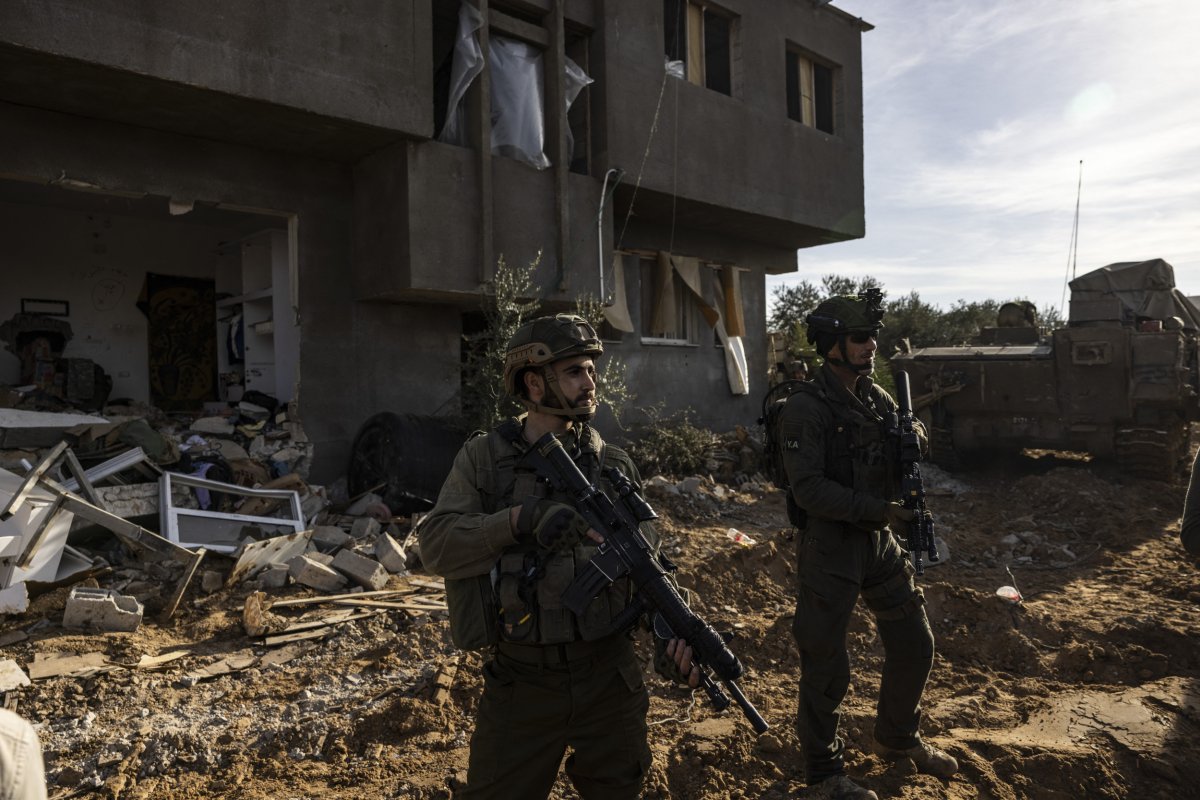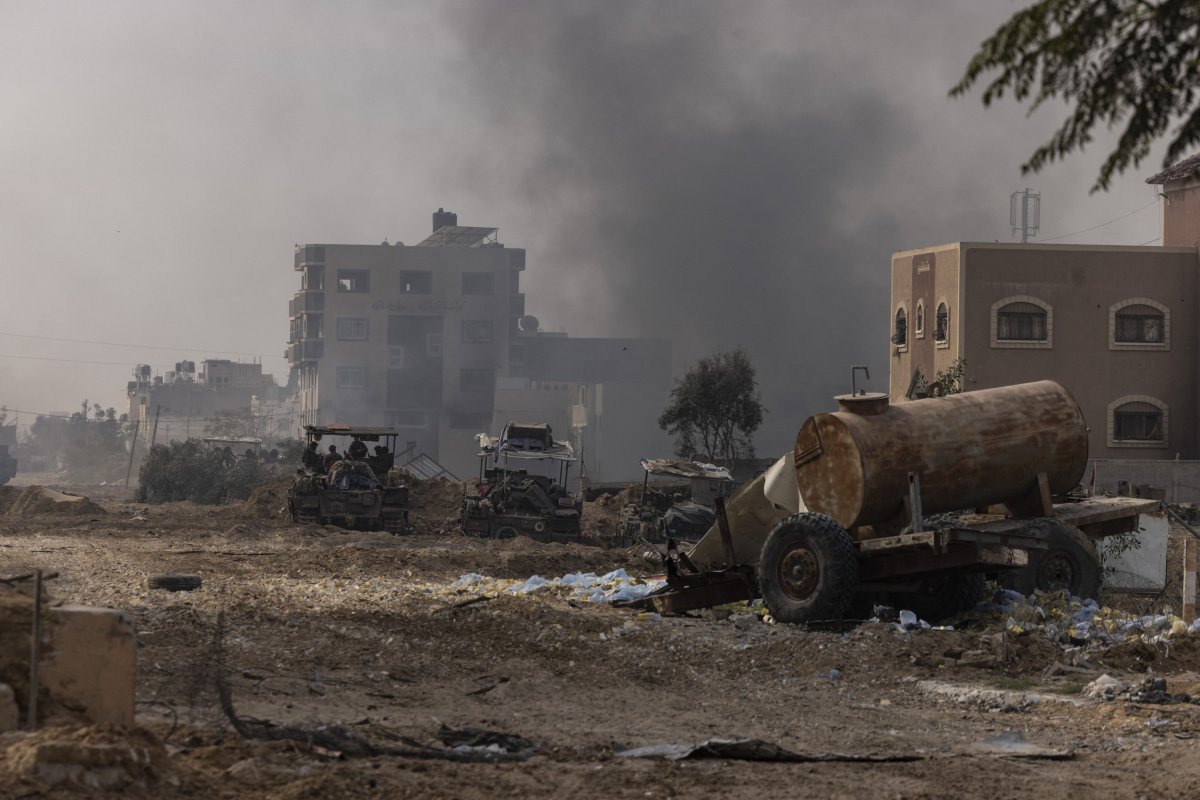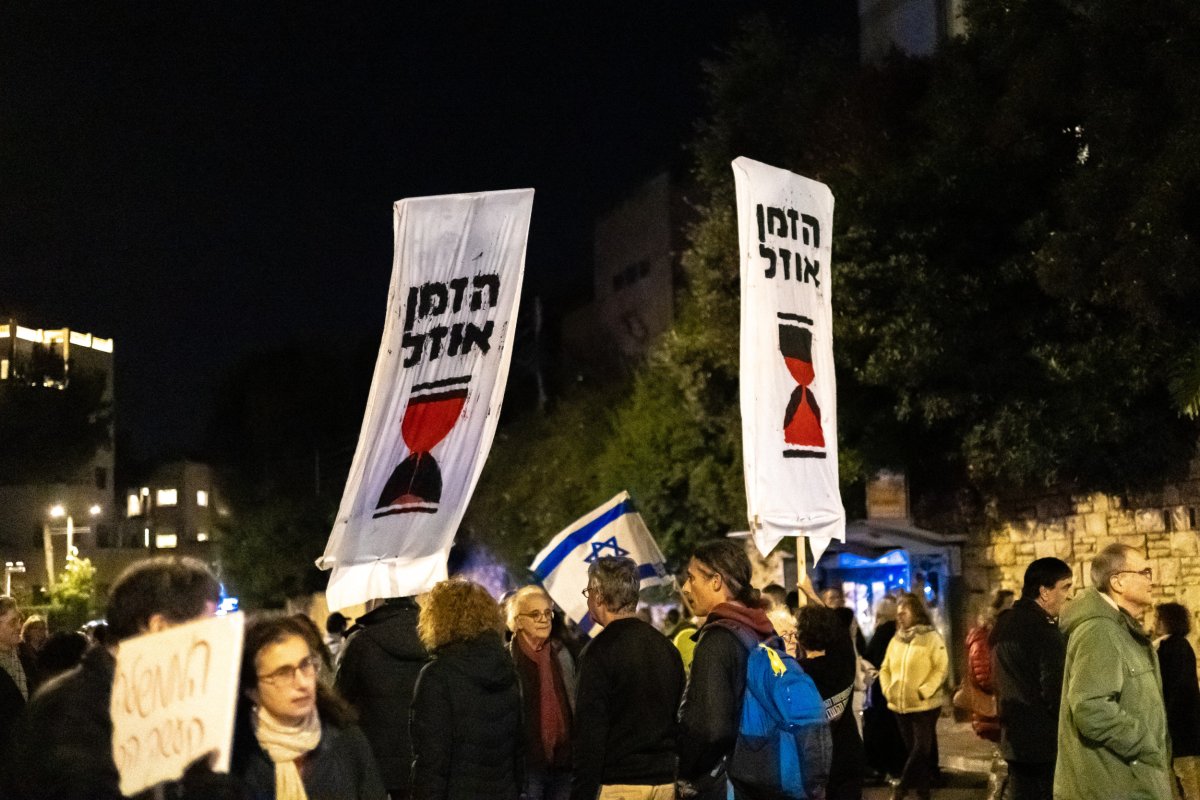David Brennan
Israeli leaders are under mounting pressure as the country prosecutes its devastating war on the Gaza Strip while spooling up a targeted assassination campaign against Iranian allies in Lebanon and Syria.
Israeli Prime Minister Benjamin Netanyahu has said that his country needs more time to achieve its maximalist objective of "eradicating" Hamas in the ravaged Gaza Strip, following the group's October 7 attack that killed some 1,200 people.
"The war will continue for many more months," Netanyahu said last week, ahead of a visit by U.S. Secretary of State Antony Blinken. "My policy is clear. We will continue to fight until we have achieved all the objectives of the war, first and foremost the annihilation of Hamas and the release of all the hostages," the prime minister has said.
 Troops in Gaza on January 8, 2024. Heavy fighting continues in the Palestinian territory.MENAHEM KAHANA/AFP VIA GETTY IMAGES
Troops in Gaza on January 8, 2024. Heavy fighting continues in the Palestinian territory.MENAHEM KAHANA/AFP VIA GETTY IMAGESBut time might not be on Israel's side. On Thursday, the International Court of Justice in The Hague began deliberations on whether Israel is committing genocide against the Palestinians in Gaza, while international calls for a ceasefire are growing and civilian casualties continue to mount.
Israel's offensive has killed more than 23,200 Palestinians in Gaza, according to the Associated Press, citing the Health Ministry in Hamas-run Gaza. Officials there say around two-thirds of those killed were women and children. The toll does not distinguish between combatants and civilians and is expected to be higher on account of people buried under rubble.
The latest news on the Israeli-Palestinian conflict.
The White House and other foreign allies are also urging Israeli restraint along the northern border with Lebanon, where there is a significant danger of a full-scale clash with the Iranian-aligned Hezbollah militia.
At home, Netanyahu is struggling to hold his fragile wartime coalition government together. The veteran prime minister is now unpopular in Israel, and opposition leader Yair Lapid is leading calls for new elections. In the U.S., Biden's close backing of Israel's war is making him toxic for portions of the electorate.
'Endless War'
The Israel Defense Forces (IDF) are still engaged in fierce fighting with Hamas in Gaza, in particular around the southern city of Khan Younis. IDF units have reported high Hamas casualties and the destruction of many underground tunnels used by the group, but they are yet to kill or capture the most senior Hamas leaders.
Jonathan Schanzer, the senior vice president for research at the Foundation for Defense of Democracies (FDD)—a think tank that describes itself as non-partisan, but is considered close to Israel—told Newsweek during a Wednesday briefing that the Israelis "need time in order to notch the military achievements that they've set out for themselves."
"This includes the killing or capture of some of the top leaders like Yahya Sinwar and Mohammed Deif. But it also is about conquering Hamas controlled territory. Khan Younis seems to be the big one right now. But they are obviously clearly aware of the restraints that are being increasingly put upon them by the United States."
The White House's patience is not unlimited, as Biden and his top officials have been trying to make clear in recent weeks. "They were aware that that clock is ticking now," Schanzer said of Israeli leaders. "They're wrestling with that timeline."
 Troops operating in the central Gaza Strip on January 8. Gaza has been devastated by the campaign, but there is little clarity on its future reconstruction.MENAHEM KAHANA/AFP VIA GETTY IMAGES
Troops operating in the central Gaza Strip on January 8. Gaza has been devastated by the campaign, but there is little clarity on its future reconstruction.MENAHEM KAHANA/AFP VIA GETTY IMAGESSome reservist units are being withdrawn from Gaza, but that does not herald the end of the fighting. Charles Kupchan of the Council on Foreign Relations think tank told Newsweek Israel appears to be transitioning into a new, less intense phase of its Gaza conflict. "But I don't think the end is anywhere in sight," he added. "This is a conflict that could drag on for quite some time."
Michael Allen—who served as special assistant to President George W. Bush and the senior director at the National Security Council—told Newsweek the Israelis are "going to continue to be very aggressive, especially on the sort of manhunt part of this, not unlike what we in the United States did after 9/11, where we systematically went after the top Al-Qaeda people."
"They are obviously going to go after Hamas, and that can be even in Europe or elsewhere in the Gulf," said Allen, who is the managing director of the Beacon Global Strategy advisory firm. "I think it extends to Hezbollah as well."
Gaza's murky future also remains a serious problem for Israel, especially with far-right ministers advocating the forced mass displacement of some or all of the 2.3 million Palestinians living there pre-war.
Mairav Zonszein, of the International Crisis Group, told a Chatham House think tank webinar this week that Israel has embarked on "an endless war."
"There's no end in sight, there's no clear victory being defined," she added. "There is a strategy, it's to continue to fight and to have no Palestinian state or solution ever. And so that is something that Israelis are not challenging enough clearly, but that the rest of the world is clearly seeing."
Schanzer said different elements of the Israeli state have different visions of Gaza's future. "I don't know how the Israelis are going to square this," he explained. "The IDF seems to have one, the political echelons they seem to have one. And by the way, left and right have different 'day after' scenarios."
And all the while, the danger of war to the north looms large. A showdown there with Hezbollah has the potential to overshadow even the horrific scenes from Gaza.

A demonstration calling for the return of hostages being held in the Gaza Strip on January 6. The sign says: "Time is running out."YAHEL GAZIT/MIDDLE EAST IMAGES/AFP VIA GETTY IMAGES
"I think Israel has its hands full in Gaza and is not relishing the prospect of a full-scale war with Hezbollah, which after all, has far more capability than Hamas did in Gaza," Kupchan—who served on the White House National Security Council under Presidents Barack Obama and Bill Clinton—said. "Both sides, I think, are exercising a certain level of restraint, wary of the strategic implications."
But Israeli leaders appear set on their demand that United Nations Security Council Resolution 1701—prohibiting Hezbollah's presence south of the Litani River, some 18 miles from Israel's northern border—be respected.
"One of the things that you're hearing the Israelis say about post-war Gaza is they're going to have to put in a big buffer zone," Kupchan added. "And I'm guessing that that's what they're going to want to do in the north as well. Can that be achieved diplomatically? Well, we'll have to see."
Political Pressure
Strain is building in Israel and in the U.S. Thousands rallied in Tel Aviv and Jerusalem this week demanding progress on the release of the remaining hostages taken on October 7 now being held in Gaza, and the resignation of Netanyahu's government.
"There is a clear sense among many, not everyone, but many that this current government has an egg timer that's going to go off at some point," Schanzer said. "Whether that's six weeks or six months, no one knows exactly."
The intelligence failure of October 7 appeared a fatal blow to Netanyahu's political career, his standing already badly eroded by years of legal troubles and increasingly hardline policy. But Israel's great survivor is still at the helm.
"Netanyahu clearly has an interest in prolonging this war for his own political survival," Zonszein said. "But I do believe that in 2024, something will have to give."
Tensions within Israel go deeper than one man. "Even if you do get Netanyahu out, that's not enough," Zonszein added. "People are challenging Netanyahu, they're not challenging the policies and the views that Netanyahu represents, which are not exclusive to Netanyahu."
Thabet Abu Rass, the co-executive director of the Abraham Initiatives NGO, which advocates coexistence and equality among Israel's Jewish and Arab citizens, concurred.
 Antony Blinken in Cairo on January 11, 2024, on his way back to Washington D.C., following a week-long trip to the Middle East. The U.S. has repeatedly urged Israeli restraint in the Gaza Strip and southern Lebanon.EVELYN HOCKSTEIN/POOL/AFP VIA GETTY IMAGES
Antony Blinken in Cairo on January 11, 2024, on his way back to Washington D.C., following a week-long trip to the Middle East. The U.S. has repeatedly urged Israeli restraint in the Gaza Strip and southern Lebanon.EVELYN HOCKSTEIN/POOL/AFP VIA GETTY IMAGES"Israel is behaving like a Jewish supremacy regime from our point of view," Rass said of Israel's Arab community, noting the controversial 2018 nation-state bill, which declared that "fulfilling the right to national self-determination in the state of Israel is unique to the Jewish people."
Israeli society, Rass said, is continuing its long drift to the right and will need foreign partners like the U.S. to bring it back to moderation.
But Americans will soon be laser-focused on their own political arena, as Biden braces for a likely rematch with former President Donald Trump in November. Weak opinion polling for the incumbent is being exacerbated by frustration among younger and more progressive Democratic voters, alienated by Biden's backing of Israel's war.
"The Israelis are deeply concerned that their war is becoming a political football," Schanzer said. "They don't want their war to be part of the discussion here, because obviously, their goals are very different to what our politicians are thinking about."
No comments:
Post a Comment